#andrei moldovan
Explore tagged Tumblr posts
Photo

Logo for Dana Oprea
https://danaoprea.com/
Andrei Moldovan - 2015
1 note
·
View note
Text
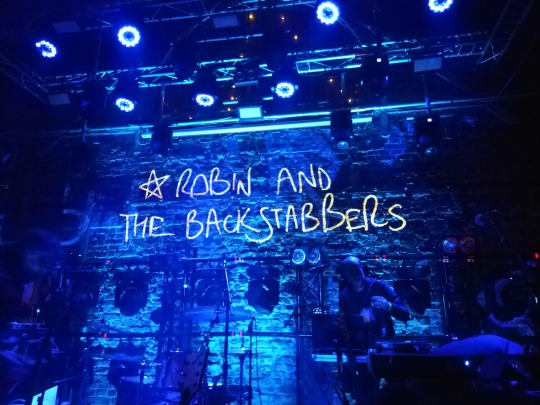

Ultimul concert pe 2022. S-aveți un an!
#Robin and the Backstabbers#Radu Moldovan#Andrei Robin Proca#live#Expirat#Romanian music#Romanian band#happy la multi ani
7 notes
·
View notes
Text
FESTIVALUL ADRIAN PĂUNESCU, DE ZIUA NAȚIONALĂ, LA CRAIOVA CEI MAI ÎNDRĂGIȚI ARTIȘTI FOLK URCĂ PE SCENA DIN CENTRUL VECHI
FESTIVALUL ADRIAN PĂUNESCU, DE ZIUA NAȚIONALĂ, LA CRAIOVA CEI MAI ÎNDRĂGIȚI ARTIȘTI FOLK URCĂ PE SCENA DIN CENTRUL VECHI
Muzica și poezia își dau, din nou, întâlnire la Craiova, la început de decembrie. Cei mai îndrăgiți artiști folk din țară deschid joi, 1 decembrie 2022, cea de-a VIII-a ediție a Festivalului Internațional Adrian Păunescu. Organizat de Fundația Culturală Iubirea și Primăria Craiova, festivalul îi readuce, în fața publicului, pe Ducu Bertzi, Mircea Vintilă, Mircea Baniciu, Andrei Păunescu și trupa…

View On WordPress
#Adrian Paunescu#Andrei Păunescu#Cătălin Stepa#Craiova#Cristian Buică#DINU OLĂRAȘU#Ducu Bertzi#Emeric Imre#FESTIVALUL ADRIAN PĂUNESCU#Fundația Culturală Iubirea#Generația Folk#George Nicolescu#Mădălina Amon#Magda Pușkaș#Mircea Baniciu#Mircea Vintilă#Primăria Craiova#trupa Totusi#Valentin Moldovan#Vanghele Gogu#WALTER GHICOLESCU#Ziua Națională
0 notes
Text
On October 20, citizens of the Republic of Moldova will head to the polls for a combined presidential election and referendum on joining the European Union. Ahead of these votes, Moscow has mounted a campaign to support pro-Russian candidates and parties, weaken incumbent President Maia Sandu, and slow Moldova’s moves to align more closely with Europe. Russian interference in Moldovan politics is not a new phenomenon: Moscow ruled Moldova for centuries and still considers it to be part of its exclusive sphere of influence, along with Belarus and Ukraine. For two decades, Russian President Vladimir Putin has sought to restore the influence that the Kremlin lost over Moldova after the Soviet Union collapsed, mostly without much success.
But Russia’s efforts to control the country have ramped up in recent years, especially since Russia invaded Ukraine in 2022. Securing a more malleable, Moscow-friendly government in Moldova has, for Russia, gone from “nice to have” to “must have,” because an independent Chisinau is crucial to Ukraine’s capacity to defend itself. Ukraine shares a 750-mile southwestern border with Moldova. Currently, Kyiv does not need to devote significant resources to securing that border, and the Moldovan government has helped facilitate crucial flows of people, goods, and supplies out of and into Ukraine.
A Moscow-aligned or deeply divided Moldova, however, would dramatically alter Ukraine’s military and political calculations. Should Moldova fall back into the Kremlin’s orbit, whether by military conquest or by an incremental process of political domination, Ukraine’s trade and resupply capability through the Black Sea would be dramatically diminished. Moscow would have a much greater chance of prevailing militarily or of dictating disadvantageous terms during peace negotiations. And Russia’s ability and appetite to attack other neighbors, such as Armenia, Georgia, or the Baltic states, would only grow. In early 2022, Russian forces aimed to take Odessa, in southern Ukraine, and then to move on to Moldova’s breakaway separatist Transnistrian region. In mid-2022, Russian officials, including Deputy Foreign Minister Andrei Rudenko, suggested that Moscow intended to take Moldova itself. When the Ukrainians halted Russian forces at Kherson, Moscow turned to hybrid actions such as sponsoring antigovernment demonstrations in Moldova, cutting gas supplies, and interfering in Moldova’s domestic politics to pursue the same end.
Many analysts present the October 20 election as a decisive tipping point. Because polling suggests that the pro-Western Sandu is quite likely to win and that the referendum on EU membership will obtain a 55–60 percent majority in favor of joining, such analyses already embed a celebratory conclusion: these outcomes will signal that Moldova is steadfastly resisting Russia’s influence campaigns and pursuing greater alignment with Europe. A September 30 Carnegie Endowment analysis, for instance, claimed that the elections will provide the “answer to the question of how much influence Russia retains in Moldova.”
But Moldova’s future—which has immense significance for Ukraine and the West—depends not only on the outcome of this single election but also on the much larger penumbra of meddlesome activities that Russia is engaging in to influence the country’s longer-term trajectory. In Moldova, the Kremlin is playing a long game. It seeks to divide Moldovan society along linguistic lines; to aggravate old ethnic fears and grievances; to infiltrate the Moldovan press; to buy off or sponsor local or parliamentary officials who, in turn, degrade trust in Chisinau; to discredit Sandu’s government; and, specifically, to force Moldova’s leaders to crack down harshly on Russian-funded proxies, thus opening themselves to accusations that they, in fact, are the people who seek to repress Moldovans and limit their freedoms.
In a sense, Moldova is now a second front in Russia’s war against Ukraine and the West—one fought not with bullets but with ballots and media broadsheets. And just as it was premature to proclaim that Russia had failed in Ukraine when it did not immediately capture Kyiv and oust Ukrainian President Volodymyr Zelensky in late February 2022, it would be equally dangerous to conclude that Russia has failed if it does not secure Sandu’s defeat on October 20. Moldova’s struggle to choose its own course will be a much longer fight—and one that the West must continue to support.
POINTS OF LEVERAGE
Since Moldova achieved independence from the Soviet Union, in 1991, debates over the country’s cultural and geopolitical orientation have dominated its domestic politics. A majority of Moldovans are Romanian-speaking and have generally supported center-right and right-wing parties that advocate integration into western Europe. But Moldova also has a sizable Russian-speaking population composed of ethnic Russians, Ukrainians, Bulgarians, Orthodox Christian Turks, and Russian-speaking Moldovans, among others. These Russian speakers have generally voted for leftist and center-left parties, many of which have a pro-Moscow orientation. This support was sufficient to give former President Vladimir Voronin and his Party of Communists a parliamentary majority from 2001 to 2009—and a plurality to its successor, the Socialist Party, for most of the period from 2014 to 2021. According to polling by multiple Moldovan NGOs, over 30 percent of Moldovans currently hold favorable views of Russia.
Moscow sees Moldova as vital for strategic depth to its southwest and to its security in the Black Sea basin. In 2003, Putin tried and failed to secure a direct, long-term, treaty-based Russian political and military presence in the country. Subsequent efforts toward this end also came up short. But the Kremlin has also sought to employ other levers of influence over Moldova. As Moldova has, until recently, been totally dependent on Russian natural gas for its energy supplies, Moscow has manipulated gas prices, supply, and debt to pressure Chisinau to adopt Kremlin-friendly policies. Although it is difficult to quantify the effects of this pressure, it has likely contributed to the continuing strength of pro-Russian forces in Moldova’s domestic politics. Additionally, for much of the post-Soviet period, tens of thousands of Moldovans lived and worked in Russia, and remittances from these migrants have been an important source of incomes for Moldovan families and businesses.
Another point of leverage is the media. The Russian-speaking segment of Moldova’s electorate remains attuned to and influenced by Russian language and culture—literature, art, music, films—and many Russian-speaking Moldovans continue to receive news primarily from Russian-language sources, including Russian state television, Moldovan and Russian websites, and social media. For years, the Kremlin has assiduously played on concerns—not always unfounded—that Chisinau will restrict or ban the use of the Russian language in schools, the media, business environments, and the procedures of the government. After independence, many of Moldova’s Romanian-speaking elites did express hostility toward the enduring presence of Russian culture and influence; in the early 1990s, some Romanian-speaking politicians would bid Russian speakers to leave the country with the slogan “Suitcase–train station–Russia!”
Although tensions between Russian and Romanian speakers persist, Moscow’s rallying cry against so-called Russophobia on the part of Moldovan leaders today is little more than a cynical scare tactic. But the incessant stream of exaggerations and outright lies that play on long-held fears and prejudices can be effective, if hard to measure. One recent poll by Watchdog.md, a Moldovan NGO, showed respondents evenly divided over whether Russia constitutes a threat to Moldova’s security. Russian Foreign Minister Sergey Lavrov’s charge that the West intends to create a “second Ukraine” in Moldova has been picked up by Moldovan social media and political opposition, who claim that reelecting Sandu will result in a war with Russia.
Finally, Moscow has also tried to exploit the unresolved conflict in Moldova’s separatist Transnistrian region, a 1,600-square-mile narrow strip of land extending about 250 miles along the east bank of the Dniester River between Moldova and Ukraine. With a large population of ethnic Russians and Ukrainians (25 percent, respectively) and Moldovans, Transnistria declared its independence from Moldova in 1990. A brief war broke out in 1992; Russian President Boris Yeltsin’s military intervention on behalf of the separatists enabled Transnistrian leaders to preserve the region’s de facto independence. To this day, Moscow keeps a contingent of troops in Transnistria, wields influence over Transnistrian authorities, and uses its role as a mediator in ongoing negotiations to exert pressure on Chisinau.
Moscow wishes not merely to dominate the separatist region but to secure Moldova’s alignment with Russia, by whatever means necessary. The Kremlin supports pro-Russian political leaders and parties, in particular the Party of Communists and its successor, the Party of Socialists, which since the late 1990s have been the leading pro-Moscow parties in Moldova. Russian leaders likely do not seek to annex Moldova outright, presumably calculating that doing so would cost them influence with other independent post-Soviet states. And Russia has not recognized Transnistria’s independence, preferring to use the region as a foothold from which to exert pressure on Moldova. Rather, Moscow seems content for Moldova to assume the role of a formally neutral and independent—but practically dependent—ally, and it is willing to go to extreme lengths to secure this arrangement.
A WESTWARD TURN
Despite Russia’s efforts to shape Moldovan politics, over the past quarter century its influence over the country’s geopolitical orientation has waned.In 2001, Voronin and the Party of Communists’ decisive electoral victory appeared to signal a turn toward the East. But Voronin became disillusioned with Russia in the course of negotiations over Transnistria, and in 2003 he rejected Moscow’s proposed solution, which would have approved a long-term Russian military presence and provided the separatist region an effective veto over national policy. Two years later, Voronin initiated his country’s slow turn toward the West, signing an EU-Moldova Action Plan that provided for greatly expanded cooperation with Europe on a broad array of security, political, economic, and social issues. In the 2009 parliamentary elections, Moldovans elected a coalition of pro-Western parties explicitly dedicated to European integration. By 2015, Moldova had signed an EU Association Agreement, won visa-free travel to the EU, and established a Deep and Comprehensive Free Trade Area with the EU.
For a few years, the country’s westward momentum was slowed by corruption and authoritarian inclinations among its leaders, as well as many Moldovans’ disillusionment with their country’s turn toward Europe. During the decade following the victory of the pro-Western coalition, most of Moldova’s state institutions were captured by the crooked oligarch Vladimir Plahotniuc. Although he never held a top government position, Plahotniuc’s Democratic Party dominated the parliament and government through bribery, blackmail, and intimidation. Plahotniuc was one of the masterminds behind the theft of over a billion dollars—fully ten percent of the country’s GDP—from three Moldovan banks. He and other perpetrators have never been punished. But in 2019, Plahotniuc and his cohort were finally ousted from the parliament and government by a broad coalition.
The following year, Sandu’s strong, inclusive anticorruption campaign messages pulled the country back on a pro-EU course. Sandu won the presidency, and her Party of Action and Solidarity (PAS) secured an absolute majority in the 2021 legislative elections. Sandu’s promise to pursue a pro-European course also contributed to her victory, as Moldovan polls throughout the previous decade showed at least 50 percent of respondents supporting a closer relationship with the EU.
Sandu did not immediately break with Russia. Initially, she adopted a conciliatory stance toward Moscow. But in August 2021, Dmitry Kozak, Putin’s deputy chief of staff, came to Chisinau with a proposal: Moldova could get low natural gas prices and Russia’s help in resolving the Transnistrian conflict in return for adopting favorable policies toward Russia, such as vowing not to pursue NATO membership. Sandu refused the deal. As a result, Moldova suffered a hard, cold winter in 2021–22, with exorbitant natural gas prices and uncertain supplies.
The war in Ukraine further damaged Moldova’s relations with Russia. Before the war, Moldova was already Europe’s poorest country, with a population of 2.5 million; Moscow’s invasion of Ukraine sent more than a millionUkrainian refugees streaming into the country. (More than a hundred thousand remain today.) Moscow denounced Sandu as a Western puppet. and in late 2022 Gazprom reduced the gas supplies it sent to Moldova, forcing it to seek alternatives, including importing liquefied natural gas from the United States. Inflation reached 35 percent and parts of the country suffered electricity blackouts.
MOSCOW’S LIMITED CAPACITY
Whether because of these developments or despite them, a majority of Moldovans now wish to join the EU. In response, Moscow has amped up its meddling in Moldovan politics, seeking to weaken or remove Sandu and her government. The Kremlin has concentrated its efforts on funneling funding to pro-Russian figures and parties through the Moldovan oligarch Ilan Shor, who fled Moldova in 2019 after being convicted of fraud, money laundering, and other charges.
Shor now lives in Moscow. But over the past two years, a steady procession of Shor-affiliated Moldovan parliamentary representatives have visited Moscow and St. Petersburg for meetings with Russian parliamentary counterparts, government officials, and NGO representatives. At a meeting in Moscow in April, remnants of Shor’s party and several splinter parties formed an anti-Sandu coalition. Last spring, Moldovan authorities detained more than 100 Russian passengers arriving at Chisinau airport; each was carrying nearly 10,000 euros. Moldovan officials allege that the money had been designated for buying pro-Russian votes and paying anti-EU demonstrators—and that Shor had a hand in organizing the scheme. Ziarul de Garda, a leading Moldovan media outlet, recently published an account by an undercover journalist who related how Russian activists affiliated with Shor recruited and paid her to join anti-Sandu demonstrations. Ahead of the October 20 election, the Kremlin is advancing as many candidates as possible in the hope of keeping Sandu’s vote share below 50 percent, which would force a second round of voting. Moldovan and Western officials report that Russia is also sending millions of dollars in clandestine funding to Moldovan opposition groups and parties. Last month, according to senior Moldovan police officials, Russian banks sent over $15 million to more than 130,000 Moldovan citizens.
In 2020, Sandu’s victory was resounding, largely driven by voters in the Moldovan diaspora in Europe and North America, who turned out in unprecedented numbers. Now she is an incumbent with a record to defend. The ambitious anticorruption program on which she won in 2020 has yet to produce significant results. The COVID-19 pandemic, as well as Russia’s manipulation of natural gas prices and supplies, has produced considerable economic upheaval: Moldova experienced record inflation in 2022–23.
But it is unlikely that Moscow will achieve an actual regime change in Moldova. Sandu’s recent poll numbers (around 30–35 percent) are close to what she achieved at a similar point in the 2020 campaign, and she polls well ahead of all of her rivals. Shor and other Russian proxies have dangled the prospect of cheap Russian natural gas and the purported advantages of joining the Eurasian Economic Union, a Russian-led trade bloc that includes the post-Soviet states of Armenia, Belarus, Kazakhstan, and Kyrgyzstan. But these appeals have mostly failed to attract voters, and none of Sandu’s challengers has a realistic chance of unseating her, even in a two-person runoff.
From 1992 until 2015, Moscow used its de facto control over the separatist Transnistrian region to pressure Chisinau. But for the past decade, and especially since February 2022, Russian authority in Transnistria has also been gradually eroding. In the immediate post-Soviet era, several large legacy enterprises dominated the Transnistrian economy. Today, a local conglomerate called Sheriff controls retail trade, media, and much else. Since 2015, Transnistrian businesses have participated in the free trade area that Moldova negotiated with the EU. This year, 80 percent of the region’s exports went to EU countries. Transnistrian officials and business leaders have told me privately that they are intrigued by Moldova’s prospects for EU membership.
Moscow has a limited capacity for launching military action from Transnistria. It still keeps about 1,500 troops in the region, but some 85 percent of them are local recruits—Russian-speaking residents of Transnistria—and their enthusiasm for the Kremlin’s broader geopolitical agenda is questionable. Additionally, Russia, with the financial assistance and monitoring of the Organization for Security and Cooperation in Europe, destroyed or otherwise removed its heavy weaponry from the region between 1999 and 2003. And in 2014, after Russia’s seizure of Crimea and attack on the Donbas, Ukraine closed its territory for transit of Russian military personnel, equipment, and weapons to the Transnistrian region. Russia cannot currently reach Moldova for resupply and personnel rotation. Moreover, Transnistrian authorities want nothing to do with Moscow’s military campaign against Ukraine. For a supposed Russian proxy, the region has been remarkably quiet about the war.
THE KREMLIN’S LONG GAME
It would be a mistake, however, to believe that Moldova’s future is secure if Sandu wins reelection. Because Moldova has a parliamentary system, the actual powers of the presidency are quite modest; the PAS’s majority in parliament has been indispensable to Sandu’s ability to shape policy and govern. Moldova’s parliament may well be the target of Moscow’s long game. The PAS appears unlikely to repeat its commanding 2021 performance in Moldova’s upcoming parliamentary election, which must be called before July 2025.
Even if overtly pro-Russian parties do not win a majority, the PAS may have to form a coalition. That may jeopardize the formation of a strong, stable pro-European government if the number of PAS deputies is reduced enough to force the party to align with centrist or center-left factions that do not have a strong pro-European record.The parliament ultimately controls all the institutional, legal, and policy changes that Moldova must make in its process of qualifying for EU membership. If the parliament becomes substantially friendlier to Russia, or even just more distant from western Europe, Moldova could slow or halt its fulfillment of various requirements to join the EU, thereby stalling or ending its candidacy for membership. Chisinau could also curtail cooperation with Kyiv in key areas such as securing their shared border and helping ensure the consistency of Ukraine’s energy supply.
Moscow’s influence campaign has not been limited to backing political candidates. Russia continues to flood both social and traditional media with disinformation. Moldovan NGOs have been tracking propaganda emanating from Moscow in the Moldovan press, revealing that the stream of disinformation into the country has steadily increased over the past two years. The Kremlin and its proxies seek to persuade Moldovan voters that the West caused the war in Ukraine, that Sandu’s government is corrupt and incompetent, that the EU will never really permit Moldova to join, and that the country’s westward trajectory will lead to war, as it did for Ukraine. Surveys of Moldovan opinion consistently show that as much as 40 percent of respondents believe these narratives.
Russia’s efforts have focused recently on Moldova’s ethnic Turkic Orthodox minority in the autonomous Gagauz region, playing on their fears of assimilation and losing their linguistic and ethnic identity, as well as their perception that successive Chisinau administrations have prevented the region from exercising all the rights afforded it under a 1994 autonomy agreement. Last year, Moscow financed the narrow victory of a Shor-backed candidate for governor of the region. Since then, Moscow has promisedthe region cheap energy, pension subsidies, and investment. In August, Shor opened an amusement park in the region. Gagauzia is too small a territory for a Russian takeover there to determine the direction of Moldova’s national politics. But it demonstrates a playbook that Moscow might use in other, more populous regions with large ethnic minorities and on the border with Ukraine.
Russia’s aggressive propaganda as well as its funding of opposition candidates has created a dilemma for the incumbent government: how to combat foreign interference without resorting to undemocratic practices. Since gaining independence, Moldova has enjoyed an admirable record of free and fair elections, despite Russian meddling. But as the Kremlin intensifies its interference campaigns, the Moldovan government is confronted with formidable participants in the political process who violate basic democratic rules of the road. Shor and other Russian proxies have relied on illegal foreign financing and vote buying, to name just two of the most egregious violations of electoral norms.
To address the issue of foreign interference in this election, Moldovan authorities have banned some Shor-backed parties and brought charges, such as illegal campaign financing, against some of his local political allies. In late 2022, the Moldovan government suspended the licenses of six television stations linked to Shor, on the grounds that they aired “incorrect information” about Moldova and the war in Ukraine. Last year, Chisinau also ordered local Internet providers to block more than 20 Russian websites; Moldova’s Security and Intelligence Service continues to identify and monitor Russian-backed Internet and social media outlets. Moscow, in turn, has cited these actions to denounce Sandu as authoritarian and undemocratic. Critics from Moldovan opposition parties and civil society also complain that the government unnecessarily extended a pandemic-era state of emergency to allow it to act by decree without normal political or judicial review.
THE FUTURE IS NOT YET WRITTEN
Moldova’s EU candidacy offers an opportunity to transform the country’s politics, society, and economy and to increase stability in the region. Although the EU granted Moldova formal status as a candidate for membership in 2022, there is no legal requirement for an immediate vote on this issue. Chisinau’s move to hold a popular referendum on EU membership concurrently with the presidential vote was strategic; it appears to stem from a desire to make Moldova’s course toward EU membership irreversible by embedding it in the constitution. Holding a vote on the EU is a risk. Referendums have failed in Moldova before, by either not gaining the required 50 percent or not meeting a turnout requirement of at least 33 percent of registered voters. But if the imminent referendum demonstrates widespread pro-EU sentiment, it will ensure a clear popular mandate for the government’s westward political course.
Since 1991, Moldova has moved away from Russia and closer to Europe. But this movement has not been uninterrupted or unidirectional. Historical voting patterns, substantial lingering sentiment favoring Russia and pro-Russian candidates, economic grievances, popular impatience with the government’s performance, and inflows of Russian money and disinformation could once again slow or reverse Moldova’s pro-European course. Moldova’s fate is important not only for Moldovans but for Ukraine’s struggle to resist Russian aggression and the future of Europe’s security. Russia’s military campaign in southern Ukraine clearly aimed to go beyond Odessa, to Transnistria and then to greater Moldova, where Moscow would likely have sought to secure a treaty-based troop presence. A full Russian military victory, extending into Moldova, could put Russian soldiers on the border with Romania.
After Russia invaded Ukraine, Washington increased its attention and assistance to Moldova, directing substantial support to the country’s energy security, infrastructure, independent media, local administration, military equipment and training, and other needs. No matter the outcome of the upcoming presidential election, these efforts need to intensify through 2024 and 2025. Both the EU and the United States can support Moldova as the country implements reforms to bring its public institutions up to EU standards, including key judicial and anticorruption reforms. Washington should also ramp up support for Moldova’s quest for energy independence from Russia, as well as for increased help in identifying and combating disinformation. Finally, Washington should intensify its push for a resolution to pressing issues between Chisinau and its autonomous Gagauz region and secessionist Transnistria.
Georgia was once moving on an enthusiastic pro-Western path but now seems to be sliding back into Moscow’s orbit. This may not now appear to be the most likely outcome in Moldova. But it is a dangerous enough one that Chisinau and its Western supporters must work hard to avoid it.
8 notes
·
View notes
Text
The Rise and Fall of Romania at Eurovision: How Did it Come to This?


An analysis by David Popescu - read it HERE I want to share the paragraph concerning Theodor's participation. I'm so glad that the truth is being spoken.
Theodor Andrei became our representative, a young and talented boy who had so many ideas and visions for his time in Liverpool. All of it, just scrapped. We even had a chat with him in Chișinău, ahead of the Moldovan national final, where he explained in deep details about everything he had envisioned. From the meaning of his entire national final performance to his expectations in Liverpool… none of it was seen. Shortly after the 2023 final, it was revealed that Theodor had scored… nothing! Literally zero points! The Romanian diaspora is very strong across Europe, but the Eurovision Song Contest just doesn’t get the Romanian attention anymore. I personally met some Romanians as well while in Liverpool, some casual viewers even, who were just there to enjoy the festivities. But when asked about this failure, they all said the same thing: this was TVR‘s zero points, not Theodor‘s.

💙💛❤️
#theodorandrei#esc 2023#eurovision romania#eurovision#romanian artist#love for theodor#truth being spoken#justice served#fvck tvr
11 notes
·
View notes
Text
My thoughts on Eurovision 2023 entries (part 2)
Here is the second part of my original post
https://www.tumblr.com/bettyg196/712764636834988032/my-thoughts-on-eurovision-2023-entries
Enjoy.
Denmark: REILEY - Breaking My Heart

Rank: #37
Rating: 3 / 10
The worst entry of the year for me. It's too generic and maybe too overproduced, this song has no soul and authenticity. The verses aren't too bad, but the chorus with Reiley's robotic voice chilled me so much that I caught a cold just listening to it. It's a big no for me, unfortunately my opinion on Denmark is rather unpopular in the fandom and Denmark will qualify for the final thanks to young kids who spend too much time on TikTok.
Romania: THEODOR ANDREI - D.G.T (Off And On)
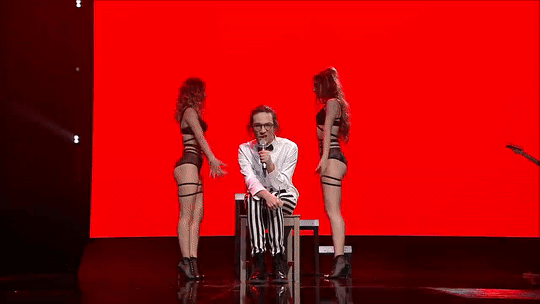
Rank: #26
Rating: 7,5 / 10
Indeed, D.G.T was not necessarily the best choice that Romania could make but it is not a musical horror either. It is a nice entry with personality. Despite his young age, Theodor Andrei is a very good vocalist and performer, he has a lot of stage presence and he gives everything. On the other hand, please change the staging !
Latvia: SUDDEN LIGHTS - Aijā

Rank: #13
Rating: 9 / 10
Latvia has bet on originality this year. Aijā is an experimental and unique song. I love how the song is musically chaotic most of the time and has a smooth ending. Sudden Lights deserves the final for me, but the band are in the toughest semi-final, I wonder how they'll fare.
Croatia: LET 3 - Mama ŠČ

Rank: #32
Rating: 5,5 / 10
Well, I'm nice, I gave Croatia the average, but it was originality and 5 other songs that saved it from the last place in my ranking. At least it's daring but musically it's too messed up. I appreciate the anti-war message of the song but I remain convinced that it is a bad choice coming from Croatia. It deserves to stay in its semi-final because it reminds me of the period of unclassifiable Eurovision songs in the 2000s, but the televote will send this entry to the final because Europeans will appreciate the chaotic side of Let 3.
Malta: THE BUSKER - Dance (Our Own Party)
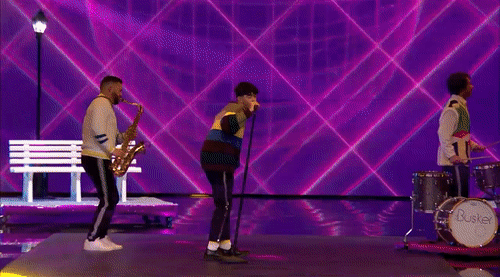
Rank: #24
Rating: 7,5 / 10
The song is not that bad, it's even good. We didn't have the Moldovan Epic Sax Guy this year but we have the Maltese equivalent. I appreciate Malta's choice even though Brooke would have been a better option imo. If Malta is lucky, it can be the surprise qualifier of the year (there is always a surprise Eurovision finalist country).
Italy: MARCO MENGONI - Due Vite

Rank: #15
Rating: 8,5 / 10
A very emotional, passionate and powerful ballad as Italy knows how to do. The song's only real flaw is the lack of surprise, but otherwise Italy hit the mark with Due Vite even though there were better options for Mahmood's country this year (Elodie 💔 Madame 💔 Rosa Chemical 💔 Lazza 💔 Levante 💔).
Lithuania: MONIKA LINKYTĖ - Stay
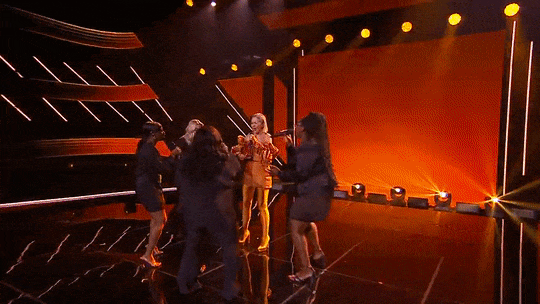
Rank: #22
Rating: 8 / 10
Very nice Lithuanian entry. Monika Linkytė is an excellent vocalist and has a good stage presence. Lithuania can go to the final I think.
France: LA ZARRA - Évidemment
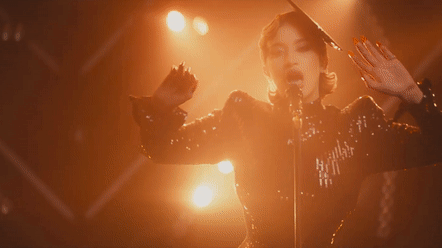
Rank: #9
Rating: 9 / 10
What a splendid chanson ! “Évidemment” fits well to La Zarra's musical universe. It's well produced and built, the lyrics have been researched. This entry leaves no one indifferent. I don't know how it will go in Liverpool, but whatever happens I'm proud that this song represents my country.
Australia: VOYAGER - Promise
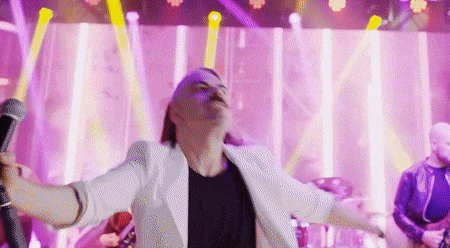
Rank: #4
Rating: 9,5 / 10
Thank You Australia! I love it ! “Promise” is one of my favorites songs of this edition. This is easily my favorite Eurovision song from this country. Finally, Australia is taking a risk by sending something that is not Eurovision encoded. In addition, I really like the universe of Voyager, the group will fly to Liverpool to my great happiness. Considering the weakness of the semi-final where Australia is, I think the country will go to the final easily.
To be continued in the next post.
#eurovision#eurovision 2023#esc 2023#esc#denmark#romania#united by music#liverpool 2023#latvia#croatia#malta#italy#lithuania#france#australia
5 notes
·
View notes
Text
Moldovan infrastructure minister Spinu resigns ahead of reshuffle
Minister of Infrastructure Andrei Spinu announced his resignation as a voluntary first step in the government reshuffle announced by Sandu in response to public criticism of the executive branch.
Spinu also stepped down from the ruling Party of Action and Solidarity (PAS). Since 2020, he has been a top adviser to Moldova’s President Maia Sandu.
His income declaration includes significant income from abroad: MDL 3.5 million (€175,000) out of MDL 4.1 million total income declared in 2023, according to Newsmaker. To explain his income, Spinu revealed that he deals with technical translation and admitted that his company has a turnover of several million dollars.
Sandu, who recently won his second term, announced last week that a staff reshuffle was imminent after promising such a move during the presidential campaign.
Economy Minister Dumitru Alaiba, Interior Minister Adrian Efros and Justice Minister Veronica Mihailov-Moraru will also be reshuffled, according to Moldovan media.
Read more HERE

#world news#news#world politics#europe#european news#moldova#politics#politics news#cabinet reshuffle#reshuffle#maia sandu#sandu
0 notes
Text
Diplomatic relations
#country#politics#public participation#country rp#country roleplay#moldovan politics#diplomatic relations#direct democracy
1 note
·
View note
Text





🎶✨ ACTU DES ARTISTES ✨🎶
C’est l’été ! Nos artistes sont sur les routes des festivals.
Jeudi 1er août : Aurélien Pascal partagera la scène avec Pierre Fouchenneret au Festival de Saint-Robert pour interpréter des œuvres de Bach, Kodaly, Paganini et Glière. https://www.festival-saint-robert.com/fr/concerts/148
Vendredi 2 août : Andrei Korobeinikov ouvrira le Festival international de piano « Crescendo Jura » avec un récital dédié à Scarlatti et Beethoven. https://www.crescendo-jura.ch/Piano-a-Saint-Ursanne/Programme-2024
Samedi 3 et dimanche 4 août : Jesko Sirvend dirigera le Moldovan National Youth Orchestra dans un programme autour de Constantin Silivestri, Ottorino Respighi, Saint-Saëns et Brahms.
Samedi 3 et dimanche 4 août : Andris Poga dirigera l’Orchestre du Schleswig-Holstein Musik Festival dans la symphonie Alpestre de Strauss. https://www.shmf.de/en/program?suchwort=Andris%20Poga
Dimanche 4 août : Kazuki Yamada retrouvera l'Orchestre philharmonique de Monte Carlo et Simon Trpčeski au Palais princier avec un programme composé de Brahms, Smetana et Prokofiev. https://opmc.mc/concert/concerts-au-palais-princier-04-aout-24/
Dimanche 4 août : Aurélien Pascal partagera la scène du Festival de la Roque d'Anthéron avec Alexandre Kantorow et Liya Petrova dans le trio de Franck. https://www.festival-piano.com/fpr_spectacle/24-08-04-20h-parc-kantorow-carte-blanche/
Restez connectés pour plus d'événements à venir !
1 note
·
View note
Photo



Logo + Business card
Chloe Perruqueria
1 note
·
View note
Video
youtube
Moldovan Pisari tamed the "The Tiger" at Enfusion 122 | Andrei Pisari vs...
0 notes
Text
"European Moldova" National Assembly Declarations

Yesterday, on the 21st of May, the "European Moldova" Assembly took place on the Great National Gathering Square (PMAN).

Official attendance estimates range between 75-80k people.

At its conclusion, the "European Moldova" resolution was adopted. With this document, Moldovans affirm Moldova's aspiration to become a full member of the European Union.
The resolution was read in the PMAN by actor Andrei Sochirca.
"We, the citizens of the Republic of Moldova, gathered on 21 May 2023 in the Great National Assembly Square, at a decisive moment for the fate of the country, to affirm the aspiration of the Republic of Moldova to become a full member of the European Union, to whose development we wish to contribute, by virtue of the fact that we are European, historically, geographically, culturally and as a set of values.
The indisputable right to guarantee a European, democratic, free and prosperous future for the Republic of Moldova belongs to the people of the Republic of Moldova.
Accession to the European Union is the only way that can bring our country stability in the face of challenges and the only chance for the development of the Republic of Moldova that will allow future generations to realise their potential, accumulate wealth, modernise the country and lead a fulfilled life. To this end, we adopt the following resolution.
We, the citizens of the Republic of Moldova, ask the political class of the Republic of Moldova, all political parties and politicians of today and all those who will decide the fate of the country in the future:
To amend the Constitution of the Republic of Moldova in order to definitively and irreversibly establish the accession of the Republic of Moldova to the European Union. This common aspiration of Moldovans must be fulfilled by all political actors in the Republic of Moldova.
To ensure that accession negotiations with the European Union are opened as soon as possible and to strengthen state institutions in order to achieve the goal of accession to the European Union.
To prepare civil servants, mayors, academics and businessmen for the EU accession process with the aim of increasing the absorption capacity of European funds and fully using the benefits of the accession process to modernise the country.
To broaden the international context of negotiations for a final peaceful settlement of the Transnistrian conflict and to use the EU accession process as a catalyst for increasing the welfare and living standards of Moldovan citizens in the reintegrated Transnistrian region.
To ensure a swift transposition of European legislation by involving specialists from countries that have recently passed through the same stage of accession, in particular Romania.
To ensure the interconnection of all infrastructure systems to the European market - electricity, gas transport, road, rail, communications - in order to exclude any kind of blackmail and ensure the independence of the Republic of Moldova to develop freely and without constraints.
Strongly condemn the illegal and inhumane war started by Russia in Ukraine, which undermines stability and seriously affects the whole region, including the Republic of Moldova, and take a clear stand against those who started the war, those declared war criminals by international institutions and those who support the war and participate in destabilising the situation in the region and in our country.
Given the desire of the citizens of the Republic of Moldova to transform the country on the European path, we call on the European Union institutions to continue their support to our country and to accept the Republic of Moldova into the European family once the conditions for accession are met," the resolution reads.

1 note
·
View note
Text
Moldovan Deputy Prime Minister Andrei Spinu on Sunday evening urged voters not to give in to electoral bribery schemes set up by “thieves, fugitives and bandits” after the oligarch Ilan Shor promised to pay people who convince others to cast ‘no’ votes in the upcoming referendum on European integration.
Spinu wrote on Facebook that this was an attempt “to buy votes, to buy people”, and to “spread lies about the European Union” ahead of the October 20 referendum, which will be held simultaneously with a presidential election.
Shor, who is a fugitive from justice after being sentenced to 15 years in prison in the ‘Grand Theft’ case involving the theft of one billion US dollars from Moldova’s banking system, is living in Moscow.
He issued his offer via Telegram at the weekend, promising money to people who would “convince as many people as possible at their polling station” to vote ‘no’ in the referendum.
He launched a chatbot on Telegram to register people and assign them “tasks”.
In addition to 500 lei [25 euros] for registration, Shor’s team is promising “2,000 lei [100 euros] for fulfilling the minimum tasks” and “5,000 lei [250 euros] – if in your polling station, the majority are against the EU and choose our candidate [in the presidential election]”, he said.
“The referendum will decide our common future… The only option is to come and vote ‘no’,” Shor wrote.
“I want to hire people, ambassadors of Ilan Shor, in the matter of the referendum. For that, you have to register with our chatbot,” he added.
Several candidates in the presidential race are suspected of having connections to Shor.
According to Moldova’s Information and Security Service, SIS, a criminal group led by Shor has received substantial funds from Moscow and is attempting to derail Moldova’s European course.
The authorities also accused Shor and his network of electoral fraud last year. Prosecutors have already sent cases to court against Shor for alleged offering of electoral bribes and fraud in the southern region of Gagauzia at elections for governor in April to May 2023 and local elections in November 2023.
In July 2024, Moldova tightened sanctions for voters who accept money, products or services to favour or reject a specific electoral candidate, with fines ranging from 1,300 to 2,000 euros.
Deputy Prime Minister Spinu urged in his Facebook post: “We are a people with dignity. Moldovans do not sell themselves… If you observe such situations, notify the police immediately by calling 112.”
3 notes
·
View notes
Text
{Mirciulica}-2022-subtitrat-Filmul-Online-Subtitrat-in-Romana-HD1
Mirciulica filmul online in-Romana subtitrat HD1
Mirciulică 2022 ?️✔️ Film Online Subtitrat in Romana 【HD】 GRATIS
"Urmărește aici 🎬|✮☛ https://t.co/vZMaoJooI6

Mirciulică Online 🎬|✮☛ https://t.co/vZMaoJooI6
Mirciulică — FILM ONLINE SUBTITRAT IN ROMÂNĂ 2022
Mirciulică (2022) Acțiune:
Mirciulică ( 2022) este un Comedie film regizat de Andrei Iancu și jucat de Mircea Popa, Elena Ivanca. Mircea, un tânăr de 30 ani din Gherla, pică un examen de magistratură la București și este nevoit să se întoarcă acasă și să locuiască cu părinții lui. Forțat de împrejurări, se angajează la un baron local care deține o firmă de salubritate, dar lucrurile se complică atunci când ajunge să lucreze pentru soția șefului.
Eliberată : Oct 07, 2022
Durata de rulare: 90 min.
Gen: Comedie
Stele: Mircea Popa, Elena Ivanca, Elena Moldovan, Denisa Vlad
Director: Andrei Iancu
Mirciulică film online Mirciulică film romanesc online Mirciulică film online subtitrat Mirciulică film online ubtitrat in romana Mirciulică film romanesc Mirciulică film romanesc trailer Mirciulică film 2022 Mirciulică film lansare Mirciulică film trailer Mirciulică film complet Mirciulică film premiera Mirciulică film streaming Mirciulică (2022), film online subtitrat în Româna Mirciulică online Mirciulică dublat în româna Mirciulică baneasa Mirciulică cinema Mirciulică cinema city Mirciulică dublat in romana tot filmul Mirciulică dublat in romana online Mirciulică dublat in romana trilulilu Mirciulică dublat in limba romana Mirciulică dublat in romana film Mirciulică dublat Mirciulică dvd Mirciulică dublat online Mirciulică film dublat in romana Mirciulică film Mirciulică film online Mirciulică full movie Mirciulică tot filmul Mirciulică online dublat in romana Mirciulică dublat in romana Mirciulică subtitrat in romana Mirciulică subtitrat in romana online Mirciulică în româna Mirciulică la cinema Mirciulică online subtitrat Mirciulică personaje Mirciulică sun plaza Mirciulică trailer filme online Mirciulică Mirciulică subtitrat Mirciulică online Mirciulică dublat în româna Mirciulică baneasa Mirciulică cinema Mirciulică cinema city Mirciulică dublat in romana tot filmul
Mirciulică dublat in romana online
0 notes
Text
Mirciulică {2022} Online Subtitrat in Romana HD-1080p Gratuit
Acum 10 secunde — Ultima actualizare 01 Noiembrie 2022 - Există mai multe moduri de a viziona filme Mirciulică (2022), va fi disponibil pentru vizionarea filme Mirciulică online în curând pe Netflix! Deci, indiferent dacă doriți să vizionați filme Mirciulică pe laptop, telefon sau tabletă, vă puteți bucura de film oriunde și cu filme Mirciulică lansarea mult așteptată!
Vezi filme Mirciulică (2022) Online Gratuit HD- 460p - 720p - 1080p Subtitrat In Romana.
Urmăriți filmul cele mai recente Mirciulică online gratis subtitrate în limba română, filme Mirciulică (2022) online subtitrate cu claritate hd și fără întreruperi.
Vizionează cele mai noi filme online hd subtitrate gratuit in limba română 2021-2022 fără intrerupere de actiune, comedie, dragoste, horror , aventură.
➤➤ Faceți clic pe linkul de aici pentru a continua vizionarea
Filme Mirciulică online subtitrate în limba română - La noi vizionezi gratis cele mai noi filme Mirciulică (2022) de pe internet la calitate HD.
Pe m.pdstream.club vezi filme Mirciulică online subtitrate în limba română, Va punem la dispozitie o colectie foarte mare de filme gratis intră și tu în m.pdstream.club devoratorilor de filme și seriale online de toate genurile.
Rezumat Filme Mirciulică (2022):
Mirciulică ( 2022) este un Comedie film regizat de Andrei Iancu și jucat de Mircea Popa, Elena Ivanca. Mircea, un tânăr de 30 ani din Gherla, pică un examen de magistratură la București și este nevoit să se întoarcă acasă și să locuiască cu părinții lui. Forțat de împrejurări, se angajează la un baron local care deține o firmă de salubritate, dar lucrurile se complică atunci când ajunge să lucreze pentru soția șefului.
Eliberată : Oct 07, 2022
Durata de rulare: 90 min.
Gen: Comedie
Stele: Mircea Popa, Elena Ivanca, Elena Moldovan, Denisa Vlad
Director: Andrei Iancu
Calitate: 4K ULTRA HD
Vizionează Mirciulică online gratis subtitrate în limba română, filme Mirciulică (2022) online subtitrate cu claritate hd și fără întreruperi.
Urmareste Filme Mirciulică Online la cea mai buna calitate HD, Mirciulică (2022) filme online hd subtitrate in limba română.
m.pdstream.club este un site gratuit unde poti viziona filme si seriale de toate genurile. Avem o foarte mare colectie de seriale online la o calitate foarte buna, majoritatea HD. Totodata la noi se actualizeaza in fiecare zi lista de filme si seriale, avem grija sa fie functionale toate sursele, deoarece stim cat de neplacut e sa cauti seriale online sau filme si sa gasesti playere care nu merg. Speram sa va placa si sa reveniti. Vizionare placuta!
Urmăriți filmul Mirciulică online subtitrat sau dublat in română si este gratuit. Urmăriți online filmul complet Mirciulică gratuit în format audio sau dublat in română, cu subtitrări și clipuri la calitate HD Full HD - 460p - 720p - 1080p - BRRip - DvdRip.
Ai căutat filmul Mirciulică dublat in română. La m.pdstream.club, ești liber să alegi din milioane de film online subtitrat în română la cea mai buna calitate.
Flux pentru tine: Adresă nouă pentru a viziona filme noi în flux gratuit
Stream pentru tine - filme noi Online Subtitrat gratuit este un nou site de Online Subtitrat ilegal cu sediul în Franța. Acest site oferă gratuit filme recent lansate și seriale utilizatorilor de internet. Are un catalog foarte bogat și variat de filme, serii, filme animate și alte producții audiovizuale de știri.
cuvinte cheie google:
Mirciulică Film Online Subtitrat in Română Mirciulică Online Subtitrat Mirciulică Online Mirciulică Film Online Subtitrat Mirciulică Film Online Mirciulică Online dublat în Română Mirciulică Film Online dublat în Română
0 notes
Text
PESTERA BOLII 🌄 #InVizita
PESTERA BOLII 🌄 #InVizita
RO: Hey! Daca aveti drum prin judetul Hunedoara nu ezistati sa vizitati Pestera Bolii! Cred ca e una dintre cele mai frumoase pesteri ale noastre. E un loc destul de atipic care iti ofera inca o data sansa de a observa cat de spectaculoasa poate fi mama natura. 💙🌍 EN: Hey! If you are going to visit the Hunedoara county, don’t hesitate to visit Pestera Bolii! I think it’s one of our most…

View On WordPress
10 notes
·
View notes